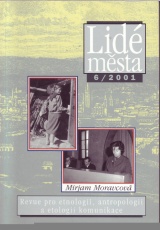Vinařská čest a sláva.
DOI:
https://doi.org/10.14712/12128112.4155Abstrakt
The study asks the question of how the notion "wine-grower" or "wine-growers' honour" is understood by the people who really perform this job in two localities and two periods (Sebechleby and its environment in Central Slovakia in the 1970s and the South Moravian town of Filipov and its rural hinterland in the 1990s). At the time of the research not everyone who grew and produced wine was automatically considered as a wine-grower in the Slovak villages. According to the Sebechleby residents, a right wine-grower (it was a role for men, there is not such a notion as a "female wine-grower'') had to peďorm all the work at the vineyard himself and at the righl time. Women could only provide some auxiliary work such as weeding, collection and pressing. At any rate, they could not work on the production of wine itself or the care for its maturation or else they would threaten the wine-growing reputation of the whole family. An exception was tolerated in the case of widows with under-age sons. The quality of wine was reviewed by "invitation to a glass of wine." A good wine-grower had to be hospitable, but on the other he had to be able to manage it well so that it survived until the next harvest. A right wine-grower also had to have his own wine cellar and above it a house for representation to which he could invite guests. The situation was different in the South Moravian villages around Filipov in the 1990s. The grapevine is no longer cultivated in small vineyards or gardens, but mostly on bigger restituted, purchased or hired vineyards. But here, too, not everyone growing and producing wine was considered as a right wine-grower. In the villages around Filipov there were similar rules defining a right wine-grower like in Sebechleby. However, the situation in the "town" of Filipov was different. The wine-growers' association included the people who did not own vineyards and did not work on them, but only financed the purchase of grapes and production of wine. They regarded the wine produced by experts as their own. Wine growing was not for them a matter of earning one´s living, but entertainment and social prestige thanks to which they joined the local business elite. The "work input" was replacecl in their case by the input of money.
Stahování
Publikováno
Jak citovat
Číslo
Sekce
Licence

Tato práce je licencována pod Mezinárodní licencí Creative Commons Attribution-NonCommercial-NoDerivatives 4.0.


